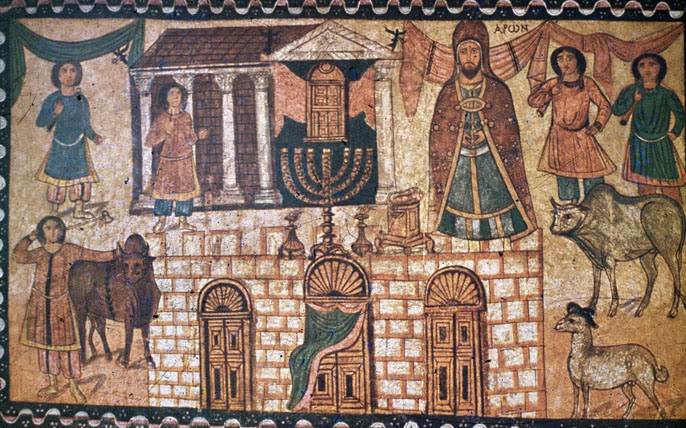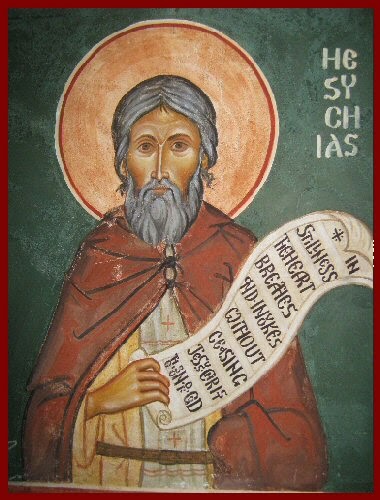Aaron and the Tabernacle, from the Synagogue at Dura-Europos, Syria (c. 245-256)
"And fire through all will be kindled upon the altar, it will not be quenched."--Lev 6:6 (LXX)
Among the many regulations the Lord gave to His servants the Israelites, and particularly to the priestly Levites, we can see two key meanings, among others: a meaning for them in their literal worship in the Temple, and a meaning for us in our interior worship in the temple of our hearts. When Leviticus thus speaks of the fire upon the altar, to draw forth spiritual meaning from the text, we should interpret the altar as the one within our hearts. Just as the Levites were called to offer burnt offerings upon the physical altar, so are we called to immolate our wills for the Lord. We are to destroy our souls to save them, to sacrifice all we have for He Who saves us.
With what do we immolate ourselves upon our heart's altar? With the fire of love, love that blazes with prayer. It is thus fire of love and prayer that the Lord came to enkindle, and it is this which He lamented was not already blazing. For He had provided much kindling through the Scriptures of the Old Covenant, but it took the spark of His Incarnation, His Resurrection, and His sending of His Spirit to light the blaze in most hearts. And once that blaze is lit, it should never be quenched.
At evening, morning, and noon, we are to praise the Lord, and we can only do so when this fire is burning. Thus the fire should be kindled "all the night until the morning." Thus we should offer prayers to the Lord in the night to throw fuel on the flame, and it should burn in our hearts as we sleep, so that it can be reinvigorated when we awake. This should not be a one-time event: branches should be added to the flame "morning after morning," each morning. The ashes that remain, the crumbled remnants of our passions and sins that have been engulfed and transfigured in the Lord's blessed blaze should be thrown far from us, "outside the camp." Thus we are ever refined by the purifying fire, and we grow ever closer to the ideal of pure love and prayer, without which all of our work is naught.
"Pray unceasingly," commanded the Holy Apostle Paul in the name of the Lord, and so we should. We must strive to always hold fast to "the prayer which is ever active in the inner shrine of the soul" (St. Hesychios the Priest). This unceasing prayer will cleanse our minds of "the dark clouds, the tempests of the demons," and after this cleansing, "the divine light of Jesus cannot but shine in it," if we keep it ever pure. Listen to the counsel of St. Diadochos of Photiki:
"When someone is trying to purify gold, and allows the fire of the furnace to die down even for a moment, the material which he is purifying will harden again. So, too, a man who merely practises the remembrance of God from time to time, loses through lack of continuity what he hopes to gain through his prayer. It is a mark of one who truly loves holiness that he continually burns up what is worldly in his heart through practising the remembrance of God, so that little by little evil is consumed in the fire of this remembrance and his soul completely recovers its natural brilliance with still greater glory."
Let us always add fresh branches to the fire on our noetic altars, both morning and night. "'In the morning sow your seed,' says Solomon—and by 'seed' is to be understood the seed of prayer—'and in the evening do not withhold your hand,' so that there may be no break in the continuity of your prayer, no moment when through lack of attention you cease to pray" (St. Gregory of Sinai). When we fail in this task of tending the flame, as I do so often, let us bid the Lord to enkindle again in us love of Him through the descent of His Spirit. Through longings and pleadings to the Lord may we beseech Him for His Spirit, offering ourselves and our wills as sacrifices to be immolated again, and "as He perceives the pleasing scent of our heart's pure fragrance, He will send the fire of His Spirit to consume our sacrifices and raise up our mind along with them in the flames to Heaven" (Sahdona). Let the words of John the Venerable draw us onwards: "Happy is he who seeks You in his being, for his own heart glows with Your fire, and his flesh and bones blaze together in its purifying force." Let us strive to fulfill the Lord's command to the Levites to enkindle the fire on the altar "through all," at all times, and thus fulfill the words of Abba Joseph of Panephysis, "If you will, you can become all flame."
St. Hesychios the Priest
Nota Bene: This post is inspired by the passage in Leviticus on the law of burnt offerings, Lev 6:1-6 in the Septuagint (and Masoretic, according to my edition) numbering, Lev 6:8-13 in many modern numberings. The quotes from St. Hesychios the Priest are from his On Watchfulness and Holiness, §§21 and 175, found in The Philokalia, Volume I, as translated by G.E.H. Palmer, Philip Sherrard, and Bishop Kallistos Ware (London: Faber and Faber Limited, 1979). The quote from St. Diadochos of Photiki is from his On Spiritual Knowledge and Discrimintation, §97, as found in Volume I of the same collection. The quote from St. Gregory of Sinai is from his On Stillness, §2, as found in Volume IV of the same collection (London: Faber and Faber Limited, 1995). The quote from Sahdona (Martyrius) is from his Book of Perfection II.8.20, as found in The Syriac Fathers on Prayer and the Spiritual Life, translated by Sebastian Brock, volume 101 of the Cistercian Studies series (Kalamazoo, MI: Cistercian Publications, 1987). The quote from John the Venerable is from his Letter 51 ("On the Vision of God"), as found in The Wisdom of the Pearlers: An Anthology of Syriac Christian Mysticism, translated by Brian E. Colless, volume 216 in the Cistercian Studies series (Kalamazoo, MI: Cistercian Publications, 2008). The quote from Abba Joseph of Panephysis is from his saying #7 in the alphabetical collection of the Apophthegmata Patrum as found in The Sayings of the Desert Fathers, translated by Sister Benedicta Ward, S.L.G. (Kalamazoo, MI: Cistercian Publications, 1984).
Text ©2014 Brandon P. Otto. Licensed via CC BY-NC. Feel free to redistribute non-commercially, as long as credit is given to the author.


No comments:
Post a Comment